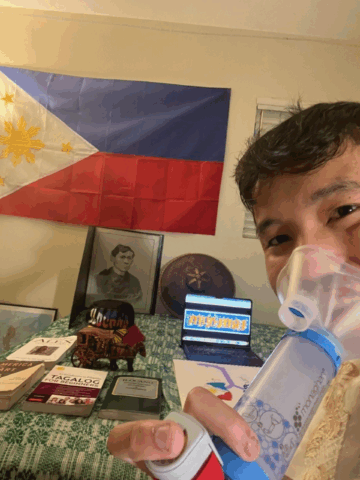The word “cancer” often elicits various emotions, such as fear, confusion and sadness, not just by the person receiving the diagnosis but by those that love and care for that person as well. A cancer diagnosis often impacts an entire family system functioning, including the sibling experience and may put siblings at an increased risk for emotional, behavioral and/or academic problems.
Drs. Tiffany Torigoe-Lai and Eric Proffitt, CHOC pediatric psychologists, share about how children and teens may experience and cope with their sibling’s cancer diagnosis and how parents can help support their children’s emotional journey.
How a cancer diagnosis can affect a sibling
A child or teenager may feel an ebb and flow of emotions as their sibling goes through cancer treatment. At times, siblings of a child with cancer may experience worry, sadness or grief about their sibling’s health and prognosis, even if their sibling is provided a highly-positive prognosis. While it’s normal for some families to want to avoid the topic of death, it is completely normal for children to think about death, including worries about losing their sibling to cancer. It’s natural for children and teens to want to talk about death.
Siblings may also struggle with not receiving enough medical information about their sibling’s diagnosis and treatment, which can make it challenging to fully understand what is happening to their sibling’s body. This may also make it difficult to navigate questions from peers or other adults if asked how their brother or sister is doing.

Mental Health Education Program (MHEP) webinars
It is natural for family roles to shift as a child or teen goes through cancer treatment due to the high demands of medical appointments, hospitalizations and in-home caregiving parents and caretakers provide. This can sometimes result in decreased parental attention or supervision for a sibling, a change in a sibling’s role within the family leading to unmet needs or parentification (when parents look to their children for emotional and/or practical support, rather than providing it) or increased family separation and loss of family routines and activities.
Feelings of sadness, loneliness, anger, jealousy, isolation, guilt and helplessness are not uncommon and may lead to increased behavioral and emotional dysregulation at home or in school. Similarly, some siblings experience oppositional behavior, social withdrawal, decreased enjoyment in previously loved activities, and decreased academic performance as result of the impact to family functioning during cancer treatment.
Coping with a child’s cancer diagnosis: Helpful techniques for parents, kids and siblings
How to support siblings of a child or teen with cancer
Drs. Torigoe-Lai and Proffitt offer the following tips to parents and caregivers to help their children and teens while their sibling undergoes cancer treatment:
Talk with them
- Engage children and teens in honest and open conversations about their sibling’s diagnosis and treatment course using developmentally appropriate language.
- Help clear up possible misconceptions about cancer, such as whether it is contagious, or do all children with cancer die.
- Help children and teens create responses for possible questions or comments from peers, teachers or other adults in their lives.
Helpful books for siblings of cancer patients
- “When Your Brother or Sister Has Cancer: A Guide for Teens,” by the National Cancer Institute.
- “Oliver’s Story,” by Mike Dodd.
- “What About Me, When Brothers and Sisters Get Sick,” by Allen Peterkin, MD.
- “What Happens When My Sibling Has Cancer: A Book for the Brothers and Sisters of Pediatric Cancer Patients,” by Sara Olsher.
Keep to routines
- Help keep life as normal and routine as possible.
- Continue regular school attendance, extracurricular activities and engagement with peers as much as possible.
Allow them to show difficult emotions
- Allow children and teens to cry and get upset about what’s happening and model for them how you’re feeling too! This helps normalize these intense feelings and makes it safe for them to show and talk to you when these feelings come up.
- Consider connecting siblings to supportive services, such as a school counselor, individual therapy, or sibling support groups, so they can build a trusted community of their own.
Create special time
- Create and maintain one-on-one time with your child by engaging in an activity of their choice for at least 10 to 15 minutes a day, like:
- Take a walk or go to a park/playground.
- Go to a favorite restaurant.
- Play a board game.
- Get coffee together.
- Read a book/story together.
- Spend time creating something, like drawing or arts and crafts.
- Make attempts to support their extracurricular activities, such as going to sports games or concerts, when possible.
- Help encourage the siblings’ relationship with opportunities to engage and play in doing activities together outside of the medical environment, such as creating a return home from the hospital routine.
Ask others for help
- Reach out to your social support system to help your child maintain their routines and activities, such as help with transportation and supervision.
- Connect with your child’s school to monitor for possible academic struggles and provide context for difficulties.
- Help your child identify safe and support persons in their lives.
- If you’re worried about your child’s coping, ask your medical team or social worker for referrals for support programs and therapies.
Get more expert health advice delivered to your inbox monthly by subscribing to the KidsHealth newsletter here.

Learn more about the Hyundai Cancer Center at CHOC
CHOC Hospital was named one of the nation’s best children’s hospitals by U.S. News & World Report in its 2024-25 Best Children’s Hospitals rankings and ranked in the cancer specialty.





